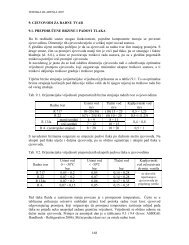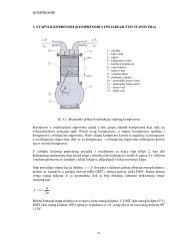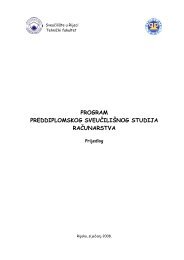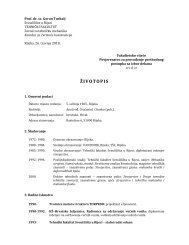universityâenterprise cooperation
universityâenterprise cooperation
universityâenterprise cooperation
Create successful ePaper yourself
Turn your PDF publications into a flip-book with our unique Google optimized e-Paper software.
Under the socialist system in former Yugoslavia<br />
(+ Albania – Slovenia = WBCs), almost all<br />
countries had a strong research capacities<br />
within large self-managed companies.<br />
Following the break-up of Yugoslavia and the<br />
collapse of the self-management system, many<br />
of these companies were broken up and their<br />
research teams were dispersed. Many researchers<br />
and engineers left established industries to set<br />
up new firms. From the other side, the new<br />
states succeeded, in some extent, in preserving<br />
science capacity in public universities and<br />
research institutes.<br />
However, new age requires new models of<br />
<strong>cooperation</strong> between universities and<br />
enterprises in Western Balkan region.<br />
The common objective of knowledge-based<br />
economic development efforts in the WBC<br />
should be focused towards the creation<br />
of an “Innovating Region”. The Western<br />
Balkan region as an “Innovating Region”<br />
should have the capability to move across<br />
technological paradigms and periodically<br />
renew itself through new technologies and<br />
firms generated from its academic base. The<br />
involvement of an entrepreneurial university<br />
in this concept is the key to the transition<br />
from regional development efforts based on<br />
existing industry to knowledge-based<br />
regional development.<br />
6.1 Challenges and prospective<br />
views<br />
Universities (higher education) and enterprises<br />
(industry) should be closely connected to and<br />
cooperate with each other for the common<br />
goal of pursuing social development. However,<br />
cultural differences are an important<br />
consideration of the development of universityenterprise<br />
collaborations. Universities and<br />
companies differ in the way that:<br />
• Research is funded;<br />
• The expected outcomes of research<br />
programs;<br />
• The way that each manages the results<br />
of research.<br />
University research is driven by individual curiosity<br />
and the desire to extend the boundaries of<br />
knowledge. The mission of most universities<br />
can be summarized as teaching, research,<br />
and outreach. In support of these elements<br />
of their missions, universities foster a culture<br />
which supports the sharing of information<br />
with colleagues and the publication of the<br />
research results in peer-reviewed journals. In<br />
contrast, companies use science to develop<br />
products that can be sold and generate a<br />
101<br />
Knowledge for<br />
Knowledge’s Sake<br />
UNIVERSITY<br />
INDUSTRY<br />
Management of<br />
Knowledge for Profit<br />
Teaching<br />
Research<br />
Service<br />
Economic<br />
Development<br />
Commercialization<br />
of New and Useful<br />
Technologies<br />
Profits<br />
Product R&D<br />
Academic Freedom<br />
Open Discourse<br />
Confidentiality<br />
Limited Public Disclosure<br />
Figure 1. Bridging and linking different cultures of academic and industrial sectors<br />
New WBC model of university-enterprise <strong>cooperation</strong> 6
















